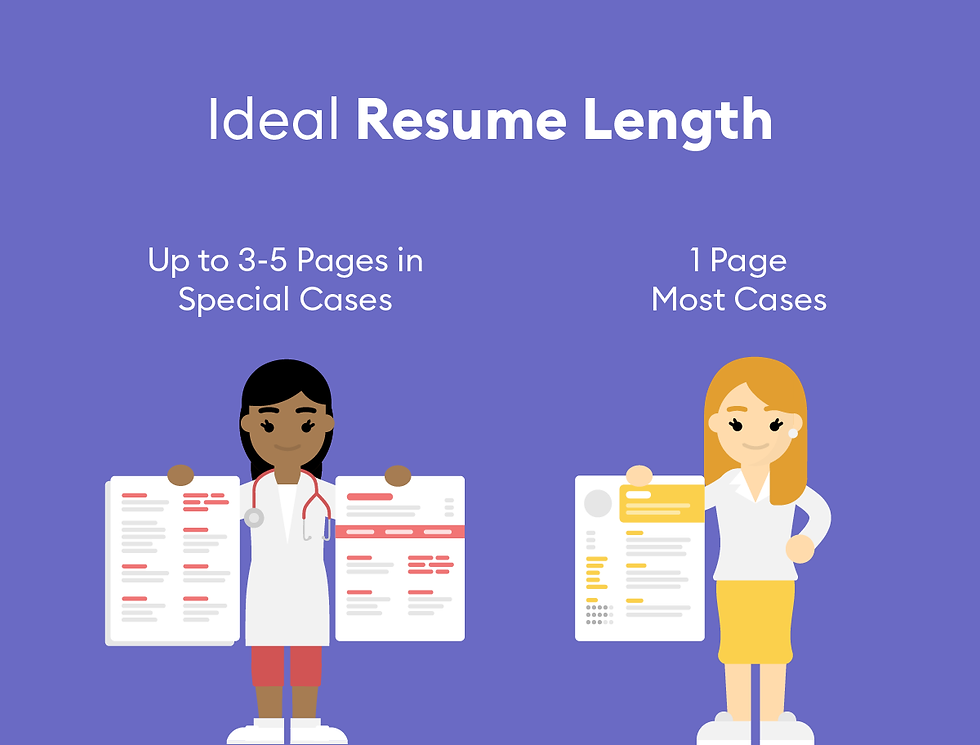Questions to Ask Yourself When Updating Your Resume.
- sachin pinto
- Jan 19, 2023
- 3 min read
An excellent resume has the power to open doors.

Grabs the attention of employers and recruiters. Sells your strongest skills and accomplishments. Shows how you're a match for a position or project. And most importantly, gets you a job interview!
This is where you should highlight the information that makes you stand out the most from other candidates. You can highlight your skills, relevant work experience , professional accomplishments, why you are passionate about the industry or a combination of several of these things. Outline your career goals
Here are Some of the Question to ask Youself When Updating Resume
1. How long should my resume be?
For most candidates, a resume should be only one page. Be brief and concise with anything you write on your resume. Customize your resume for the job you're applying for and include only relevant experience. If you've done everything right, you shouldn't get past one page.

A two-page resume works well for many job candidates. It's particularly useful for job seekers with 10 or more years of relevant experience. The extra page can be necessary to communicate all of the skills and experience the employer needs to see.
2. Should I specialize my resume or keep it general?
A specific objective is always better than a vague or general one. You can read more about resume objectives in our article, Should You Use a Career Objective on Your Resume? To sharpen your focus, you can also add a section called something like "Summary of Qualifications," "Profile," or the like.

A specialization is an area of expertise in your field of work.
Examples of specializations also include:
20th-century literature.
Data visualization.
Market research.
Rhetoric and composition.
Search engine optimization.
Technical writing.
Urban and community planning.
User experience design.
3. What should I include or leave off of my resume?
If you want to write a resume that says “Hire me,” then every word, number, line and achievement must be carefully considered. So hit the backspace button on seven commonly overlooked things you should remove from your resume ASAP

Things you should take off or leave off of your resume.
Age.
Day-to-day tasks from previous jobs.
Email address or phone number from your current employer.
First and third person references.
High School.
Old jobs.
Personal Information.
4. Should I list my work achievements?
Listing achievements instead of responsibilities can really boost your chances of getting hired. You can mention achievements in your resume summary and work experience section. If you don't have much work experience, you can also use achievements in education, volunteering, or projects sections.

List of achievements
Re-organized something to make it work better.
Identified a problem and solved it.
Come up with a new idea that improved things.
Developed or implemented new procedures or systems.
Worked on special projects.
Received awards.
Been complimented by your supervisor or co-workers.
5. What resume format is best to use?
To make the most of this resume format, focus on unique, detailed work achievements that show you’ve made steady and significant progress in your career. You should also highlight key skills that fit the job description.

Your education section should also feature any specialized classes or training that match the job you want.
The chronological resume (also known as the reverse-chronological format) is the most popular format and the best resume format for experienced candidates. The chronological resume emphasizes your work history section, where you list information about current and past jobs with the most recent job first.
6. What are resume keywords and why should I use them?
The job of keywords is to get the attention of hiring managers because it matches the job description. Given that most recruiters and hiring teams simply scan resumes for relevant experience, having keywords makes your resume stand out against all other candidates
Resume keywords are words or phrases that describe specific job requirements. They are the abilities, skills, expertise, and values that the recruiter is looking for in a candidate. Hint: Abilities, skills, and values you should possess.

Your resume keywords should include specific job requirements, including your skills, competencies, relevant credentials, and previous positions and employers. Essentially, keywords should be words that, at a glance, will show the hiring manager that you are a good fit for the job.



Comments